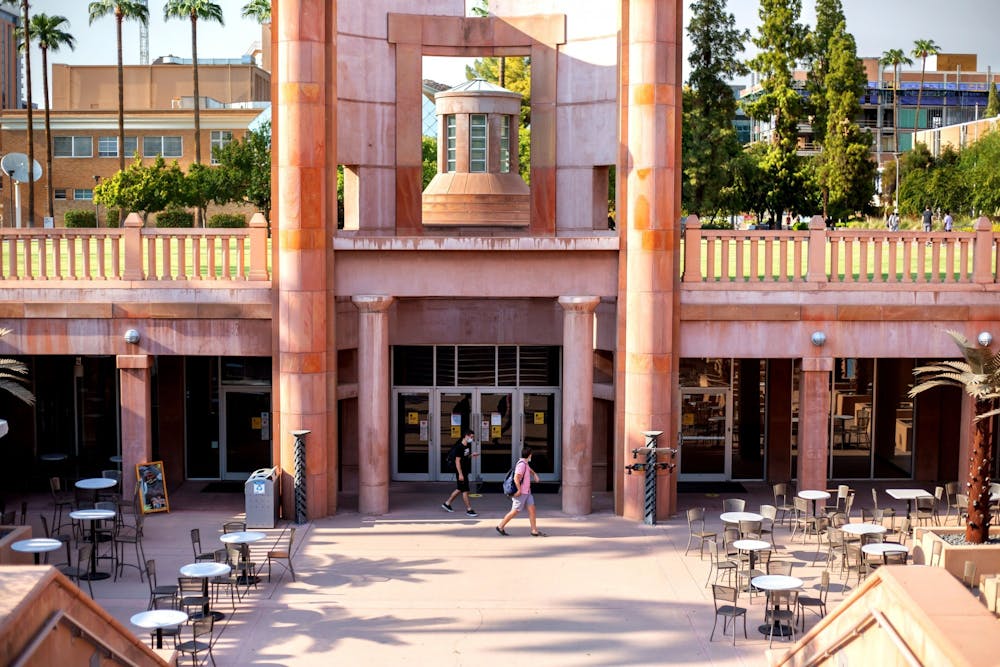Earlier in the semester, the Unit for Data Science and Analytics at the ASU Library promoted Kerri Rittschof to director. She has plans to improve the unit and make data science more accessible to everyone at ASU, no matter what they study.
Rittschof started at the unit in as a program manager to encourage student engagement. Now, as the director, that remains her primary goal.
"(I'm) really focusing on ensuring, engaging and seeing those lightbulbs go off for students … having those a-ha moments with students that they can use data science in whatever field they're in," she said.
Data science refers to a wide array of tools and techniques for analyzing large amounts of data, usually using coding, statistics or mathematics. It is a tool all researchers, even those unfamiliar with computer science, can use.
"(Data science) is here, employers really care about it. Looking into the future it will be important to have that familiarity," Rittschof said. "To stress, we don't have to be a data scientist to use data science in our work. It's about, what story do we want to tell? We have this data, what do we want to know from it?"
One of the current programs is a self paced Canvas course.
"I definitely encourage the Canvas course, there is no programming required, so anyone can do this course," Rittschof said.
The idea of making data science accessible was echoed by Debra Riley-Huff, the associate university librarian for Engagement and Learning Services.
According to Riley-Huff, the library makes the Unit for Data Science and Analytics physically accessible, with an eye not just on future careers, but on current academics.
"We help with dissertations, theses, and every way we can to fill that gap between the traditional classroom or the online classroom," Riley-Huff said.
While many of the resources from the unit are offered virtually, it does have a collaborative area on the third floor of Hayden Library.
"We share this suite with the Makerspace students. It's just a really comfortable environment trying to make data less scary," Riley-Huff said.
One of the main programs in the unit is the open lab. Despite the name, it is not a research lab and is instead a collection of webinars and exercises offered every semester for all students to join.
The final open lab webinar for this semester is titled, "It's Complicated – Using Machine Learning Techniques" with Shawn Walker and Allan Colbern, assistant professors at the School of Social and Behavioral Sciences.
"The purpose of this talk is (to show) application. A lot of the talks are methodological or technique-oriented. So this talk is, 'How do we apply this to research? What are the limitations and what are the pitfalls when you apply this to social sciences?'" Walker said.
Walker and Colbern have been collaborating on a machine learning project since 2021, focusing on different facets of how the news discusses immigration and immigrants.
"(Machine learning) allows us to be a lot more efficient and structure the qualitative work that we are doing … we can look at, for example, news articles over three or four decades," Colbern said.
According to Colbern, the duo has six working papers, one to do with how the word 'crisis' is used in news articles. Machine learning allowed them to look at around 100,000 news articles to understand 'crisis' and how that term is used to label immigration and immigrants.
"The kind of questions that we are able to bring to this area will not only help organizations communicate with reporters, it will help them change narratives around immigrants and immigration," Colbern said.
Anyone interested in this research, and how data science can be applied to the social sciences, can attend Walker's and Colbern's webinar on April 5.
Walker also produces a podcast with former Data Science and Analytics director Michael Simeone, called Misinfo Weekly, in association with the unit.
After the upcoming talk, the lab is in a transitional period, and Rittschof is in the process of building a new team to further the goals of the unit.
"We not only have a data scientist position, but also a digital humanities analyst position for more of that social sciences background to intertwine the field in all disciplines," Rittschof said. "When the team is here, I want to get their ideas and their passions as well. This is the organizational psychologist in me. I want to find out what is our own 'why' and what do we want to do."
Edited by Annie Graziano, Piper Hansen and Caera Learmonth.
Reach the reporter at syramir2@asu.edu and follow @nerdyoso on Twitter.
Like The State Press on Facebook and follow @statepress on Twitter.
Sophia is a senior studying biological sciences. This is her fifth semester with The State Press. She has also worked as a science and technology reporter.




